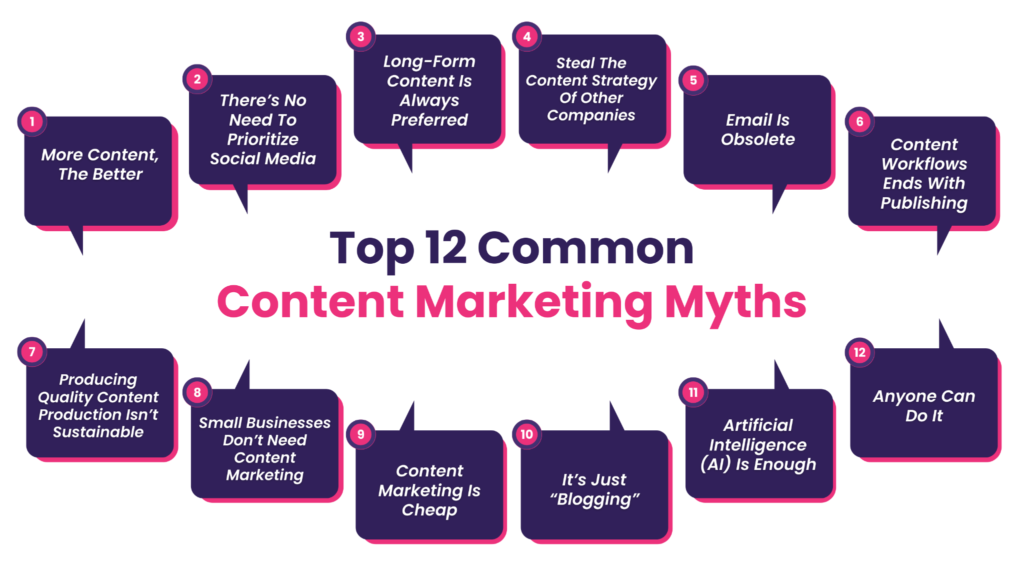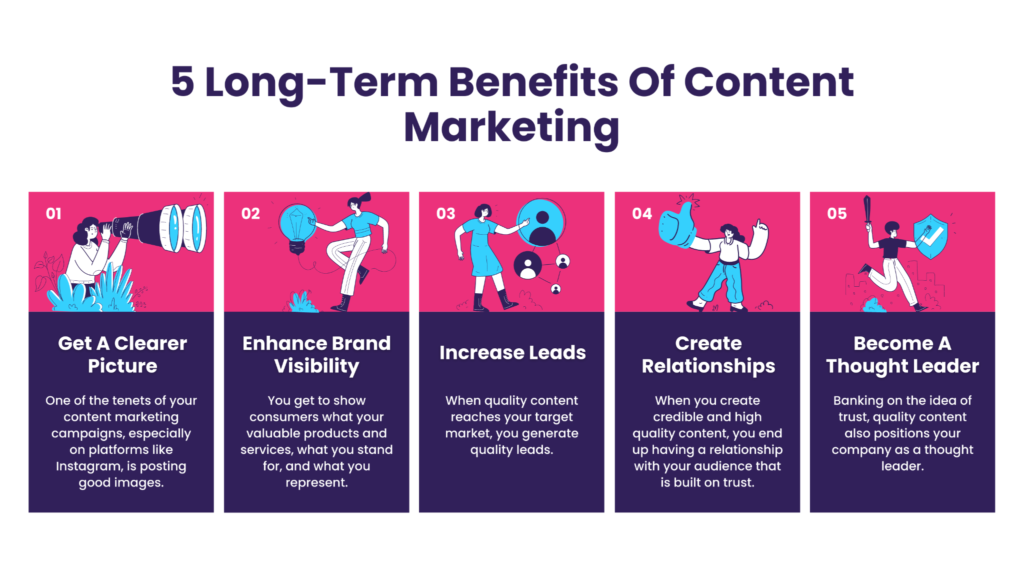Menu

Whenever you interact with your fellow content marketers, it’s a given that your field of expertise is necessary for all types of businesses, regardless of size and niche. However, a discovery call or a quick scroll through your social feed is most likely enough to bring out harmful content marketing myths and misconceptions. You’ll realize that you were living in a content marketing bubble all along.
A lot of brands think content marketing isn’t a necessary investment. You could impulsively publish short articles every few months, and let Google do its thing. Some even create a handful of trendy videos to increase their chances of going viral.
The unfortunate truth is that businesses don’t employ the right content marketing strategies. They go in blindly with their half-baked content ideas in hopes that people will follow them and buy their products. This stems from the perpetual issue of marketing myths that are proliferating the realm of business today. So here’s a round-up of 12 common content marketing myths that you should unlearn right now:
Quality content is a great lead-generation machine. No wonder businesses – whether they’re one-man teams, start-ups, or large corporations – invest so much time and resources into perfecting their content creation and production workflows. But it’s also no surprise that there’s so much misinformation floating around when it comes to the best practices of content marketing.

Truth: It’s best to create high-quality content at a consistent schedule instead of publishing thousands of mediocre content left and right.
Having more content – even if these are articles, social media posts, or other forms – isn’t always better. You need to create content that provides real value. And sometimes when you publish content too frequently, you end up compromising quality. You produce content that’s technically valueless and frustrates your readers.
Keep in mind that search engines like Google penalize low-quality content. That’s why you need to put a lot of time and effort into planning your content marketing campaigns. Set realistic goals and feasible deadlines to hold yourself accountable.
Truth: Social media is an effective avenue to generate leads.
Social media marketing is a thread of content marketing. If you want to get the most out of your content marketing efforts, you need to be active on social platforms. Almost everyone is using social media these days which is why you need to build your online presence.
Many brands tend to neglect the power of social media marketing because they believe that only the young and tech-savvy demographic is on these sites. Their customers will instead actively search for their products and services on Google. This is faulty logic. You shouldn’t let your content marketing success solely rely on the algorithm of search engines.
Truth: Customer preferences for article length vary. Test different styles and formats to optimize your conversion rates.
Don’t get us wrong: We’re almost certain that a 100-word blog post isn’t going to rank in the SERPs. It wouldn’t be meaty enough for search engines to consider your article sufficient to fulfill a user’s search intent and direct more website traffic toward you. However, this doesn’t necessarily mean that you have to gun for 3,000 words.
The optimal blog post length is as long as it takes for you to make your point. Don’t write long articles for the sake of it. Create them because that’s how much space it needs to clearly explicate the information you want to share. It would be wise to find content gaps in competitors’ articles so that you know which angle you could sharpen.
Truth: Know that your target audience has their own pain points, motivations, and interests. Tailor-fit your content accordingly.
One of the common myths in marketing is that you should stick to using tried and tested tactics and that you could just copy the marketing strategy of say Nike or Apple. Just because the content marketing strategy of another business worked, this doesn’t mean you’ll reap the same results. Each content strategy is unique to every business and industry. There’s no one-size-fits-all model.
You don’t need to follow every content marketing fad. You don’t have to use trending audio or relate to the latest news. You just need to know what messages and content pieces resonate with your target audience. What makes them tick? When you put your customers at the core of your content marketing process, you’ll effectively convert them into loyal clients.
Truth: Email is one of the best content distribution channels.
“Social media has made email obsolete” is a statement that could be no further from the truth. While it’s important to engage customers on social platforms, email marketing is a non-intrusive way to promote your content and increase conversions.
Email marketing and content marketing complement each other. With email, you can leverage buyer personas, audience segmentation, and personalized messaging. You will also get a higher average return for every dollar that you invest in your email campaigns.
Truth: You need to determine which content performed best to gather insights into what resonates with your followers. This helps you make more informed decisions in terms of content direction.
Your work isn’t done once you click “Post.” Reviewing the content published on your content marketing platforms gives you a clearer idea of what content pieces your audience enjoys and shares. Which social media posts have been reaching or exceeding your KPI goals? Have people been commenting and sharing their insights? Should you double down on video content?
That said, don’t focus on a single metric. While you’ll always want to boost your revenue and increase conversion rates, there is a multitude of factors that you need to consider before you call your content marketing campaign a success. Examples include click-through rates, demographic composition, and keyword rankings.
Truth: In the planning stage, make sure that your content marketing strategy is informed by sustainability and leverages your assets.
“Scaling content production is expensive.” This is one of the most prevalent content marketing myths. You might be overthinking about how you’ll run out of engaging things to talk about or that you need to hire more professional writers to meet the demands of your content calendar. And that’s understandable – these are reasonable worries.
This is when you take a step back, recalibrate your content marketing strategy, and really take the time to see if your content is both addressing your customers’ concerns and bringing positive change to your community (including your business). Listen to both your customers and the content team. You could also reuse or repurpose content to extend its lifespan.
Truth: Content marketing works for all types of brands, industries, and offerings.
Another myth that a lot of small businesses perpetuate is that content marketing is a size-specific strategy – meaning users only consume content from larger, credible brands and that bigger corporations have the money to see significant content marketing results. Every brand, regardless of size, will inevitably benefit from an effective strategy.
Content marketing influences revenue. On a basic level, humans latch onto stories. This means that incorporating storytelling in your content should pique the interest of your audience. If your business story is unique and compelling, it’s worth writing about and creating content for.
Truth: Be reasonable with your content marketing budget, as well as patient with results.
One of the most common content marketing myths is the price of a successful campaign. While outsourcing content is an option, it is worth your time to find a content strategist in your niche that you can afford.
You want a guarantee that detailed research (e.g., competitive research, performance tracking, SEO-optimized title tags) will go into your content marketing workflow. It’s better to invest in 1 exceptional content piece than 20 quick and poorly-written articles.
If you want a successful content strategy, you need to play the long game. Money aside, you have to constantly remind yourself that you’re growing a loyal customer base. You’re helping your potential customers move down the sales funnel. So you can’t expect quick results.
Truth: Content marketing is an umbrella term that encapsulates marketing formats, as well as the entire content creation, distribution, and analysis processes.
As we’ve mentioned, content marketing focuses on stories – how your business offerings fit in the customer journey. It’s not a fancy term for “writing blog posts.” If anything, individuals with a skill set in content marketing know how to work with SEO best practices, audience intel, complex information, existing customers, and tie together various content formats (e.g., video marketing, social media, email) in the overall strategy.
Speaking of content formats, as the adage goes, never put all your eggs in one basket. Diversify your content marketing efforts. Create a blog. Publish short-form videos. Have a newsletter. But most of all, tell a story.
Truth: Accept that a successful content strategy takes a lot of resources. AI should only be used as a tool.
A content marketing campaign takes a lot of time, research, and effort. There’s no denying that you can get AI to do all the work. Just load up ChatGPT; give a prompt; and wait for it to produce an entire article. Afterward, call it a day.
However, you can’t expect results from robot-generated content. When you fully automate the entire content marketing process, you’ll end up with impersonal messaging that doesn’t strike a chord with your customers. You need a human voice. Indeed, AI tools help streamline the content creation process, but they should remain just that – tools.
Truth: Creating great content is a very specific, high-level skill.
One of the content marketing myths that we will never get tired of debunking is that “Anyone can make content.” To some extent, this is true: Anyone can fill a website with words, any person with Instagram can post a picture, and anyone with a smartphone could upload a video on YouTube.
But not everyone can make great content. Just like how you wouldn’t ask someone without a healthcare background into a medical position at a hospital, you shouldn’t give a content marketing position to someone who hasn’t proven their skill set. Creating content takes talent. And talent isn’t easy to find when they’re already busy at their own jobs.
Content marketing isn’t merely a buzzword. It’s a necessity for modern brands if they want to stand out in a crowded market and experience its compounding returns. In fact, it is one of the most cost-efficient and effective marketing strategies to date. Let these 5 long-term benefits of content marketing convince you:

Content isn’t just about the words on the screen. It’s a myriad of formats that connect with your target market – may it be through video content, a podcast, audiograms, and so forth. Each one provides value. Each one should give you insights into the content preferences of your audience and steer you in the right direction.
On the topic of pictures, one area where many businesses fall behind is imagery. One of the tenets of your content marketing campaigns, especially on platforms like Instagram, is posting good images. The wrong photo can damage your conversion rates, causing you to have a negative return on your content investment.
Content marketing increases brand awareness. This is an important goal to have as it entails that people are more likely to purchase from your business, a brand that they recognize and trust.
You get to show consumers what your valuable products and services are, what you stand for, and what you represent. It’s not just name recognition. It’s about what makes your brand different from the rest.
One of the surefire ways to enhance brand visibility in search engines is to focus on creating relevant content that improves your website’s online authority. The more quality pages that you have indexed on Google, the more you gain more opportunities to rank on SERPs and topics that your customers search for.
When quality content reaches your target market, you generate quality leads. In other words, quality lead generation starts from the planning stage and trickles all the way down the sales funnel. For example, you could leverage the dynamics of Twitter to educate your clients through short-form text and reply to their concerns. Say thank you to them. Show them that you care.
Don’t forget to add compelling calls to action at the end of your content pieces. These strong, actionable phrases should inspire the viewer to do something – whether that’s downloading a lead magnet, clicking a button, or adding an item to their cart, among others.
Brand affinity refers to how customers feel about your brand, as well as their shared values. Individuals with a high brand affinity are your top fans, your brand evangelists, and advocates that constantly rave about your content and offerings. They’ll take every opportunity to tell others how great you are. This way, you’ll get your name out through word of mouth.
Content marketing plays a crucial role in your reputation. When you create credible and high-quality content, you end up having a relationship with your audience that is built on trust. You become their first go-to source when it comes to finding information about your industry.
Banking on the idea of trust, and quality content also positions your company as a thought leader. Your content demonstrates topic expertise; customers are more inclined to click your articles; and thus you rank higher in search engines.
When you buy into marketing myths, this could cost your business thousands of dollars and missed opportunities. Conversion rates will inevitably suffer when you fail to implement best practices in your content marketing strategy, as well as correct the misconceptions in your head.
But when all is said and done, you’ll find that your content marketing efforts will be worth it in the long run. It may take months or even years to see the results you’re hoping for, but you’ll stand a better chance if you stay consistent and make informed (and fact-checked!) decisions.
